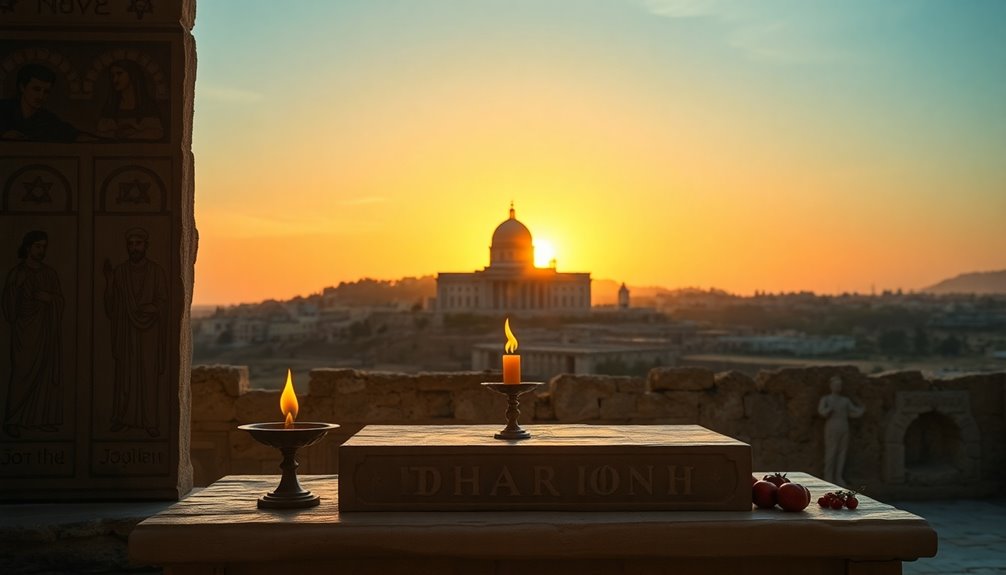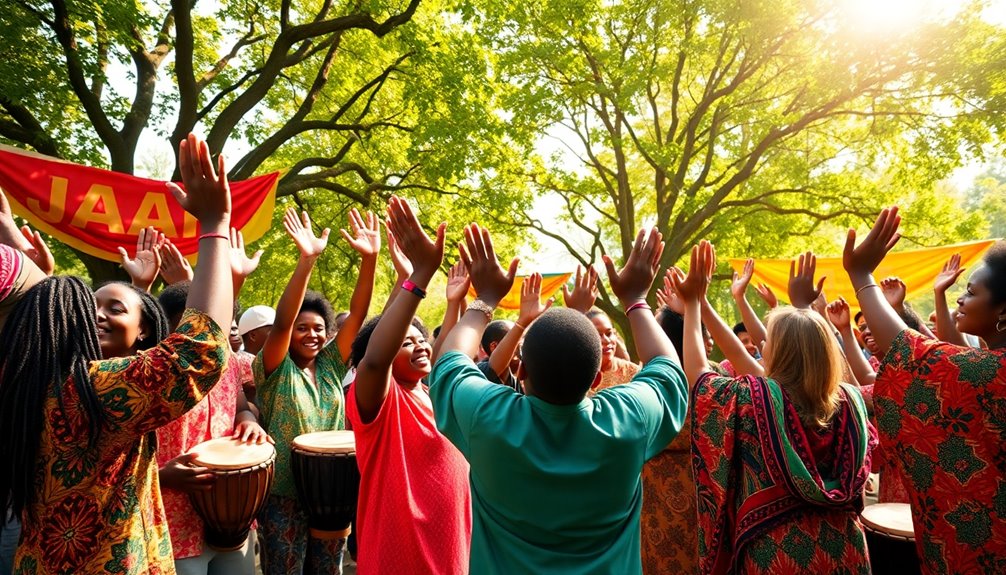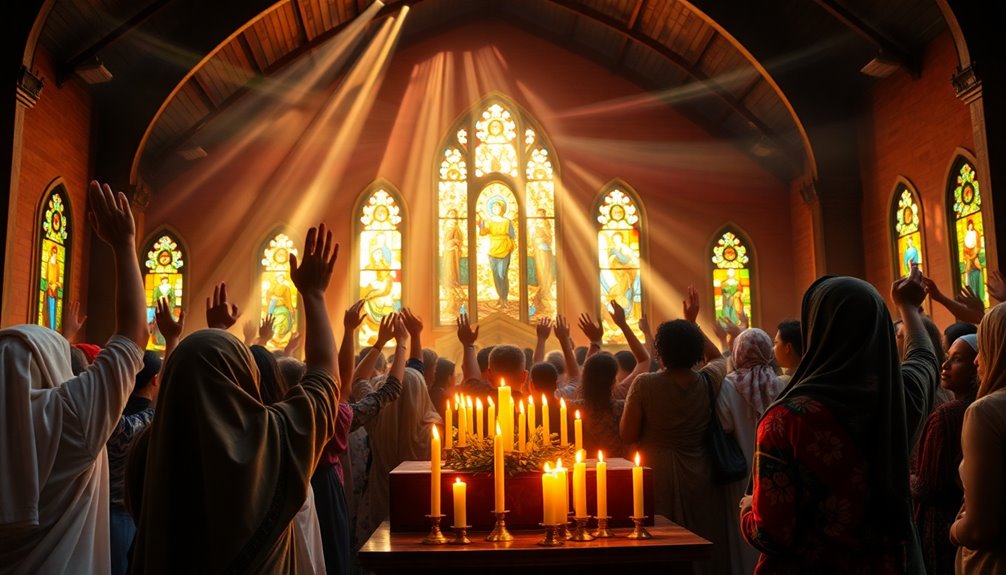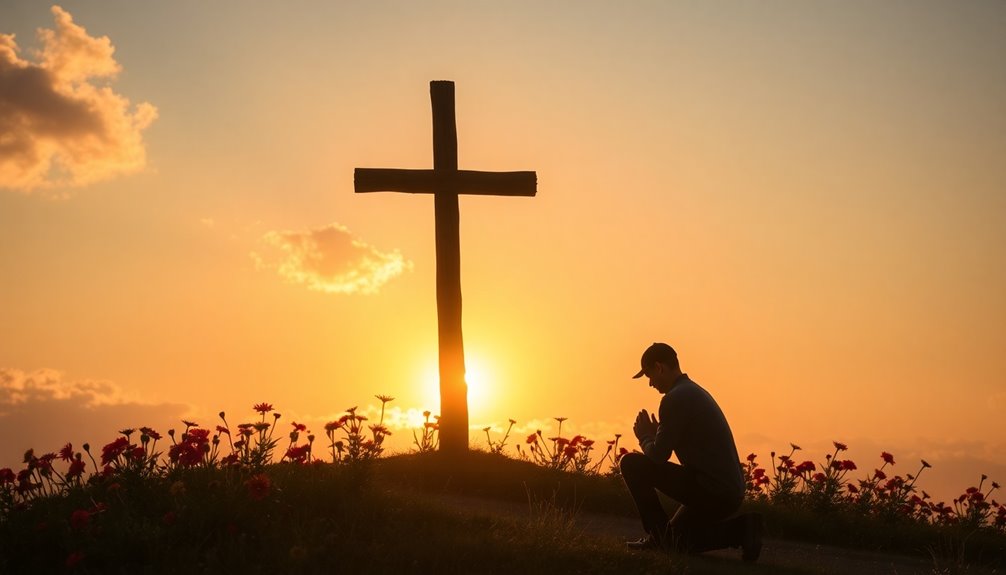Jah is a significant figure in Rastafarian culture, representing a deep connection to the divine. Short for the Hebrew name YHWH, Jah embodies love, mercy, and guidance. Unlike traditional Christian views of God, Jah is seen as a singular entity, often linked with the messianic Emperor Haile Selassie I. You'll find Jah's influence in reggae music, where themes of spiritual devotion and social justice are prominent. Daily prayers and communal gatherings strengthen the bond among Rastas, enhancing their faith. There's much more to discover about Jah and his impact on spirituality and culture.
Key Takeaways
- Jah is a shortened form of YHWH (Yahweh), representing a personal connection to the divine in Rastafarian culture.
- Jah is seen as a singular entity and is associated with Emperor Haile Selassie I as a messianic figure.
- The name Jah signifies attributes of mercy, power, and love, deeply rooted in biblical references.
- Worship of Jah includes prayer, reggae music, and communal gatherings that emphasize unity and spiritual growth.
- Ganja is considered a sacrament in Rastafari, enhancing meditation and communion with Jah during worship.
Introduction

Jah, a powerful term rooted in the Hebrew name YHWH (Yahweh), plays a significant role in Rastafarian culture. For you, as someone exploring the Rastafari movement, understanding Jah is key. This name, a shortened form of Yahweh, emphasizes a personal connection to the divine. Rastafarians view Jah not just as a distant deity but as a guiding force in their lives, distinct from traditional Christian interpretations.
In Rastafarian belief, Jah is seen as a singular entity, rejecting the conventional triune God concept. This unique perspective shapes how you might engage with the teachings and practices of the Rastafari movement. Jah's influence permeates Rastafarian music and culture, especially in reggae, where themes of love, protection, and guidance echo throughout lyrics.
Additionally, Jah is associated with Emperor Haile Selassie I, whom Rastafarians regard as a messianic figure and a representation of African heritage. Embracing Jah becomes a profound journey for you, connecting with the spiritual essence of Rastafarian beliefs and understanding its significance in broader cultural contexts.
Significance of Jah's Name

When exploring the significance of Jah's name, you'll find it deeply rooted in biblical references.
Primary and secondary sources highlight its meaning and importance, revealing how this name shapes spiritual understanding.
Understanding these references can enhance your appreciation of Jah's role in both scripture and Rastafarian culture.
Primary Bible References
One key reference to Jah can be found in Psalm 68:4, where His name is celebrated as a symbol of divine presence. This biblical name for God, a shortened form of the Tetragrammaton (YHWH), conveys a profound meaning—"I am" or "the existing one."
Throughout the Old Testament, the name Jah emerges as a beacon of redemption and salvation, reminding you of His deep connection with humanity.
The significance of Jah extends beyond mere references; it resonates through the worship practices of believers. The expression "Hallelujah," which translates to "Praise Jah," underscores His vital role in biblical praise traditions.
When you invoke Jah's name, you're not just using a title; you're engaging with the attributes He embodies—mercy, power, and an ever-present love that shapes your understanding of His nature.
In various texts, Jah's name reinforces His central figure in the relationship between God and humankind.
Secondary Bible References
Beyond the primary references, secondary mentions of Jah throughout the Bible further illuminate His significance. For instance, in Psalm 68:4, you find a direct call to "sing unto God" and praise His name Jah. This verse connects Jah with divine power and mercy, showcasing the depth of God's character.
By using Jah, you're reminded of a personal connection to the God of the Bible, emphasizing that He's not just an abstract concept but a guiding presence in your life.
In Rastafarian culture, Jah embodies a powerful figure, distinct from traditional Christian interpretations, and highlights the name's importance in spiritual practices. The term "Hallelujah," which means "praise Jah," signifies joy and reverence for God and is used widely across various religious contexts.
Furthermore, Jah is often associated with themes of redemption and salvation in the Old Testament, reinforcing His vital role in humanity's relationship with God. Each mention of Jah serves to deepen your understanding of His characteristics, urging you to reflect on the profound ways His name resonates throughout scripture and in your own spiritual journey.
Ancient Hebrew Worship Practices

Ancient Hebrew worship practices revolved around the Tetragrammaton (YHWH), the sacred name of God that held profound significance in their religious life. This four-letter name appears 6,828 times in the Hebrew scriptures, emphasizing its centrality in worship. Due to its sanctity, the name was rarely pronounced aloud; instead, alternatives like Adonai or HaShem were used.
Worship rituals included sacrifices and offerings, which expressed reverence and maintained the covenant relationship between the people and God. Festivals such as Passover were crucial, as they provided communal opportunities to celebrate and remember divine acts.
The Temple in Jerusalem stood as the focal point of worship, where priests conducted rituals and sacrifices on behalf of the community, honoring YHWH.
Music and song also played a vital role in ancient Hebrew worship. Psalms often praised God's name and attributes, enhancing communal worship and fostering a sense of connection among worshipers.
Through these practices, the ancient Hebrews not only honored God but also reinforced their identity and faith in a shared spiritual journey.
Cultural Context of Jah

Jah frequently emerges as a central figure in Rastafarian culture, representing a deeply personal connection to the divine. In this context, Jah is derived from the Hebrew name YHWH (Yahweh) and serves as a focal point of worship and reverence.
Unlike traditional Christian views, Rastafarians believe that Jah isn't triune, emphasizing a direct and individual relationship with God that transcends religious doctrine.
The biblical phrase "Hallelujah," meaning "God be praised," resonates throughout Rastafari, aligning the movement with its rich biblical roots. For followers, Jah embodies both a guiding and protective force, influencing daily spirituality and practices.
This personal relationship with Jah is celebrated through reggae music, where lyrics often highlight His love, guidance, and presence within individuals and the larger community.
Imagery, such as the Lion of Judah and the vibrant colors red, green, and gold, further emphasizes Jah's significance in Rastafarian culture.
These symbols represent various aspects of faith and heritage, reinforcing the community's connection to Jah.
In essence, Jah's role in Rastafari is both profound and intimate, shaping the spiritual life of its followers in unique and meaningful ways.
Jah's Pronunciation Variations

When you hear different pronunciations of Jah, like Yahweh or Jehovah, it's easy to get confused about their meanings.
Each variation carries its own significance and reflects distinct cultural and historical contexts.
Understanding these differences can help you grasp Jah's true importance beyond common misconceptions.
Address Misunderstandings About Jah
Many people often confuse the pronunciation of Jah due to its roots and cultural significance. Jah is a shortened form of the Tetragrammaton YHWH, pronounced as Yahweh in scholarly contexts. This biblical name for God appears in Psalm 68:4 in the King James Version, highlighting its deep roots in scripture.
Variations like Jehovah arose from blending the vowels of Adonai with YHWH, leading to debates on the correct pronunciation.
In Rastafarianism, the name Jah emphasizes a personal connection to the divine, distinct from traditional Christian interpretations. For many within this movement, Jah represents a more intimate understanding of YHWH.
Misunderstandings about Jah's pronunciation often stem from cultural differences and the influence of various religious practices. You might encounter different pronunciations in different communities, but recognizing those variations is essential to appreciating the name's significance.
Misinterpretation of Jah's Significance
Jah is frequently celebrated in music and cultural expressions within the Rastafarian community, contributing to its varied interpretations and associations with divine presence.
It's essential to recognize these differences to appreciate Jah fully.
Faith in Daily Life

Incorporating daily prayer practices into your routine can deepen your connection with Jah and guide your decisions.
Participating in congregational worship allows you to share experiences and strengthen your community ties while seeking divine wisdom.
Together, these practices shape a life that's rooted in faith and spirituality, reflecting Jah's influence in everything you do.
Daily Prayer Practices
Daily prayer practices among Rastafarians play a vital role in connecting with the divine and seeking guidance in everyday life. When you engage in daily prayer, you invoke the name of Jah, establishing a personal connection to the divine.
This practice isn't one-size-fits-all; some Rastafarians prefer collective prayers during communal gatherings called "reasoning," while others find solace in solitary prayer.
Reggae music and hymns often serve as powerful forms of prayer, allowing you to express your devotion to Jah through themes of love, redemption, and empowerment. During these moments, you may also choose to use ganja as a sacrament, believing it enhances your spiritual insight and connection during prayer and meditation.
Your prayers typically emphasize social justice, peace, and unity, reflecting a commitment to addressing societal issues through faith in Jah.
Whether you're seeking strength for personal challenges or striving for a deeper understanding of your place in the world, daily prayers can guide you toward the Holy Spirit and help you manifest your beliefs in your daily life.
Congregational Worship Practices
Within Rastafarian communities, congregational worship practices are essential for fostering a sense of unity and spiritual growth. You'll often find members engaging in communal gatherings known as "reasoning," where discussions about spirituality, community issues, and the teachings of Rasta god Jah take center stage. These gatherings strengthen bonds and deepen understanding among the community.
Reggae music is a vital part of worship, with songs reflecting Jah's love and guidance, as well as the struggles of the African diaspora. This music serves as both a powerful expression and a medium for spiritual connection.
Additionally, Rastas embrace an Ital diet, focusing on natural, unprocessed foods that align with their beliefs of living in harmony with nature and Jah's creation.
During worship, you might notice the use of marijuana (ganja) as a sacrament, believed to enhance meditation and communion with Jah. Rituals often include singing, chanting, and drumming, creating a vibrant atmosphere that reinforces shared beliefs in Jah's presence and guidance in daily life.
Engaging in these practices fosters a strong sense of community and spiritual awareness among Rastas.
Jah's Impact on Worship Practices

Jah deeply influences worship practices among Rastafarians, shaping their spiritual expressions and communal activities. Central to these practices is music, particularly reggae, where artists convey themes of divine guidance and love through heartfelt lyrics dedicated to Jah.
As you join Rastas in communal gatherings known as "reasoning," you'll discover a space for discussing spiritual beliefs and shared experiences, deepening your connection to Jah and the community.
In Rastafarian worship, marijuana, or ganja, plays a significant role as a sacrament, viewed as a means to enhance spiritual awareness and communion with Jah. This practice highlights the importance of a natural lifestyle, which also reflects in dietary choices like the Ital diet, promoting health and spiritual purity in relation to Jah.
Symbols such as the Lion of Judah and the colors red, green, and gold are integral to Rasta worship, representing Jah's sovereignty and a connection to African heritage.
Additional Resources

To deepen your understanding of Jah and Rastafarian beliefs, exploring various additional resources can be incredibly beneficial.
Start with the writings of Marcus Garvey, a pivotal figure in the Pan-African movement who inspired Rastafarian thought. His teachings emphasize self-empowerment and the importance of African heritage, which are key to grasping the cultural context of Jah.
Next, delve into the speeches and writings of Haile Selassie I, who Rastafarians revere as a messianic figure. His addresses often reflect the divine presence of Jah and the importance of faith and unity among African peoples.
Documentaries and films about Selassie's life can also provide valuable insights into his influence on Rastafarianism.
Additionally, consider reading the King James Version of the Bible, particularly Psalm 68:4, where Jah is mentioned. This verse is significant in Rastafarian worship and their understanding of God's power.
Lastly, engage with Rastafarian literature and music, as they often express the essence of Jah and the movement's beliefs.
Frequently Asked Questions
Are Jah and Jesus the Same Person?
No, Jah and Jesus aren't the same person.
You'll find that Rastafarians view Jah as a singular divine presence, while Jesus is seen as the Son of God in Christianity. This distinction is crucial.
Rastas believe Jah embodies divine authority, particularly through Haile Selassie I. In contrast, Christians recognize Jesus within the Holy Trinity.
Who Is Jah for Jamaicans?
For Jamaicans, Jah represents a deeply personal and loving Creator who guides and protects them in daily life.
You'll find that Jah is often seen as a source of strength, hope, and resilience, especially in the face of historical struggles.
This connection reflects in the vibrant culture, especially in reggae music, where themes of love, justice, and resistance resonate.
Embracing Jah means embracing a powerful spiritual identity that shapes their experiences and beliefs.
Do Christians Call God Jah?
Christians typically don't call God Jah, as this name is more closely associated with Rastafarian beliefs.
While you might encounter Jah in some Christian hymns or discussions, it's not a common term in mainstream Christianity.
Most Christians refer to God using titles like Father or Lord, reflecting their understanding of the Trinity.
If you're exploring these names, it's essential to recognize the differences in theological significance between the two belief systems.
What Religion Does Jah Belong To?
Jah belongs to Rastafarianism, a religion that emerged in Jamaica during the 1930s.
In this belief system, Jah represents a singular divine presence, distinct from traditional Christian interpretations of God. Rastas view Jah through the lens of biblical truths and African heritage, often linking Him to Emperor Haile Selassie I.
While Jah is recognized in Rastafarianism, it's important to note that this perspective differs from those found in Christianity or Judaism.









